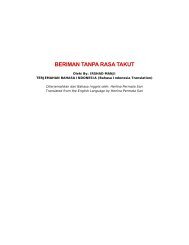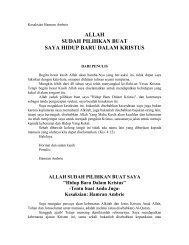A Critical Analysis of 'Real Islam'. Its People ... - Bukti dan Saksi
A Critical Analysis of 'Real Islam'. Its People ... - Bukti dan Saksi
A Critical Analysis of 'Real Islam'. Its People ... - Bukti dan Saksi
Create successful ePaper yourself
Turn your PDF publications into a flip-book with our unique Google optimized e-Paper software.
The Encyclopedia <strong>of</strong> Islam, [3] , states on abrogation:<br />
Rather than attempting to explain away the inconsistencies in passages giving regulations for the Muslim<br />
community, Kuran scholars and jurists came to acknowledge the differences, while arguing that the latest verse<br />
on any subject "abrogated" all earlier verses that contradicted it. A classic example involves the Kuranic<br />
teaching or regulation on drinking wine, where V, 90, which has a strong statement against the practice, came to<br />
be interpreted as a prohibition, abrogating II, 219, and IV, 43, which appear to allow it.<br />
Therefore, because <strong>of</strong> the changing circumstances in Muhammad’s time, various Qur’anic passages<br />
are recognized as having been abrogated, and it is normal that some Islamic doctrine changes over time.<br />
As such, rules that were once correctly applied to one set <strong>of</strong> circumstances, may not necessarily apply to a<br />
different reality at a later date. This concept is unusual by Western religious standards in its scope, and<br />
there are even minor disagreements within Islam regarding which teaching or doctrine abrogates another.<br />
In general, Muslims recognize more recent passages and writings as the most applicable, abrogating<br />
earlier references on the same subject matter. Therefore, when discussing Islam and Jihad, what must be<br />
considered most applicable are Muhammad’s final teachings and commands, especially what his last<br />
wishes and instructions were regarding Jihad and violence. From the viewpoint <strong>of</strong> the non-Muslim world,<br />
we must know which Qur’anic passages are still in force today for the Muslim community, and which are<br />
not. Earlier statements related to peace may or may not have been abrogated by later statements related to<br />
violence, or visa versa. We must carefully examine the context <strong>of</strong> the texts to know which Jihadic<br />
directions are acceptable and in force today.<br />
The revered work "al-Nasikh wal-Mansukh" (The Abrogator and the Abrogated) deals in great detail<br />
with many subject matters addressed in the Qur’an wherein there appears to be some conflict or<br />
contradiction. The book goes through every sura (chapter), pointing out in full detail every verse which<br />
has been canceled, and the verse(s) which replace it. The author notes that out <strong>of</strong> 114 suras, there are only<br />
43 which were not affected by this concept. As an example <strong>of</strong> the scope <strong>of</strong> abrogation in the Qur’an: there<br />
are 125 versus that call for tolerance and patience which have been canceled and replaced by sura 9:5:<br />
"Fight and slay the Pagans wherever ye find them, and seize them, beleaguer them, and lie in wait for<br />
them in every stratagem (<strong>of</strong> war)....." and sura 5:33: "For those who do not submit to Allah their<br />
punishment is . . . execution or crucifixion, or the cutting <strong>of</strong>f <strong>of</strong> hands and feet, from the opposite sides, or<br />
exile from the land".<br />
[See: Ibn Hazm al-Andalusi, An-Nasikh wal- Mansukh, Dar al-Kotob al-'Elmeyah, birute, 1986 p.27]<br />
Muslim activists universally fail to reveal to Westerners this major doctrine, hiding the fact that<br />
earlier conciliatory passages have been rendered null and void for over 1300 years. When Westerners<br />
discover it on their own they complain we misinterpret such writings or misapply their impact. Muslim<br />
promoters prefer to polish <strong>Islam'</strong>s image by quoting the earlier abrogated Meccan passages that call for<br />
patience and forbearance. Spokespersons hide or omit Medinan passages that clearly call for killing and<br />
maiming. When hearing people explain Islam claiming the earlier more peaceful verses are dominant in<br />
Islamic philosophy, one must judge between two options; Either the presenter is completely ignorant <strong>of</strong><br />
genuine Islamic doctrine, or he is practicing <strong>of</strong>ficially sanctioned Islamic deceit.<br />
Because opinions with regard to proper conduct between believers and non-believers varies widely,<br />
the question <strong>of</strong> which Qur’anic verses are ‘alive’ and being applied today, is critical to understanding<br />
‘Real Islam’, and potentially to our own survival. Ibn Warraq summarizes the Muslim concept <strong>of</strong><br />
abrogation as follows:<br />
"Contradictions do abound in the Koran, and the early Muslims were perfectly well aware <strong>of</strong> them; indeed they<br />
devised the science <strong>of</strong> abrogation to deal with them. It is a very convenient doctrine that, as one Christian<br />
unkindly put it, ‘fell in with that law <strong>of</strong> expediency which appears to be the salient feature in Muhammad’s<br />
prophetic career’. According to this doctrine, certain passages <strong>of</strong> the Koran are abrogated by verses revealed<br />
afterward, with a different or contrary meaning. This was supposedly taught by Muhammad himself, at Sura 2,<br />
verse 105: 'Whatever verses we cancel or cause you to forget, we bring a better or its like.' …Now we can see<br />
how useful and convenient the doctrine <strong>of</strong> abrogation is in bailing scholars out <strong>of</strong> difficulties- though, <strong>of</strong> course,<br />
it does pose problems for apologists <strong>of</strong> Islam, since all the passages preaching tolerance are found in Meccan<br />
(i.e., early suras), and all the passages recommending killing, decapitating and maiming, the so-called Sword<br />
Verses are Medinan (i.e., later); ‘tolerance’ has been abrogated by ‘intolerance’. For, the famous Sword verse,





